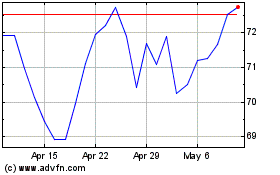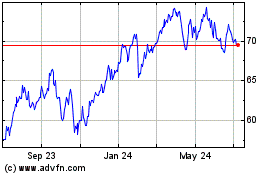By Leslie Scism and Joann S. Lublin
Long before MetLife Inc. Chairman and Chief Executive Steven
Kandarian won his legal showdown with the U.S. government, he faced
doubters inside his own boardroom.
"What are the chances that we will win?" one skeptical director
asked before the giant insurer sued its regulators, according to a
person familiar with the situation.
"On the better side," he answered, according to another person
familiar with the conversation.
The decision to take on the federal government was a major
gamble for the 64-year-old Mr. Kandarian, a low-key executive known
for his caution and reserve.
MetLife was one of four nonbanks tagged by U.S. regulators as a
threat to the financial system, but it was the only company to go
to court to challenge that designation and the extra layer of
regulation it brings. The challenge risked customer and regulator
opprobrium.
Last week, the bet paid off: A federal judge agreed the December
2014 decision by U.S. regulators was flawed, freeing MetLife from
potentially higher capital requirements and other restrictions. In
her opinion, unsealed Thursday, the judge took regulators to task
for what she called an "unreasonable" decision to ignore the cost
of stricter supervision of the firm. The administration is expected
to appeal the ruling in the coming weeks.
"He has been vindicated," said Morgan Stanley President Colm
Kelleher, a friend of Mr. Kandarian's who also has a business
relationship with MetLife. "Many people thought it was a losing
battle."
Mr. Kandarian declined to be interviewed for this article.
The MetLife CEO seems an unlikely foe for Uncle Sam. A former
government official who ran the U.S. agency that insures private
pensions, he is quieter than his extroverted predecessors at
MetLife who were known for breaking into song at company events and
speaking to employees at town hall-style settings. He joined in
2005 as the insurer's chief investment officer.
Not long after becoming CEO in 2011, Mr. Kandarian began
preparing for a legal challenge, according to people familiar with
the events. He ultimately won over internal skeptics by promising
to avoid the bombastic language of all-out war.
MetLife's adversary was the Financial Stability Oversight
Council, a group of top financial regulators with the authority to
identify "systemically important financial institutions," or SIFIs,
that could threaten the U.S. economy should they fail in another
crisis.
General Electric Co. is dismantling its giant finance business,
GE Capital, after it was designated a SIFI, in part because the
regulations hurt its returns. American International Group Inc.,
too, has come under pressure from investors to break up to escape
the extra regulatory burden. MetLife itself has outlined plans to
shed a chunk of its U.S. life-insurance business for what it said
were strategic as well as regulatory reasons.
Mr. Kandarian's major concern was that the Federal Reserve would
require unusually thick capital cushions, forcing MetLife to raise
prices or quit lines of business. He said publicly that such
onerous oversight would put the company at a competitive
disadvantage when compared with rivals.
His view was that MetLife was swept up in "the overreaction and
overzealousness of regulators to prove they were doing something"
to prevent future financial crises, said one person familiar with
the situation.
The first step toward an eventual lawsuit came in November 2012,
when Mr. Kandarian reached out to a lawyer who is highly respected
for challenging federal agencies: Eugene Scalia, son of late
Supreme Court Justice Antonin Scalia and a partner at Gibson, Dunn
& Crutcher LLP.
It was still months before MetLife officially would come under
consideration as a SIFI, but Mr. Kandarian wanted help if MetLife
decided to turn to the courts.
"I was impressed that he was seeing around the corner...in a
legally sophisticated way," Mr. Scalia said.
Mr. Kandarian at this point was already frustrated with federal
regulators. In early 2012, an Internet bank owned by MetLife had
flunked a Federal Reserve "stress test" designed to gauge its
ability to absorb losses in another financial downturn. That test
result quashed MetLife's plans to buy back shares and raise its
dividend.
MetLife was the only life insurer tested, and Mr. Kandarian
complained publicly that the Fed's "bank centric" test didn't
reflect important distinctions between life insurers and banks,
which the Fed had historically regulated. Mr. Kandarian also
suggested that the Fed's math was wrong, a comment criticized by
some investors and analysts.
The experience "left a bad taste in [MetLife's] mouth," said
Ryan Krueger, a stock analyst with Keefe, Bruyette & Woods.
Mr. Kandarian learned a public-relations lesson from the
stress-test failure and took his views about regulators behind
closed doors. He began discussing the prospect of tighter U.S.
scrutiny during nearly every private board meeting, people familiar
with the situation said.
When MetLife directors asked whether a lawsuit would harm the
company's reputation, alienate customers or antagonize regulators,
Mr. Kandarian promised a measured approach. During one board
discussion in October 2014, he said MetLife "was not declaring war
against the government," said one person familiar with the
conversation.
"Steve kept saying repeatedly, 'If we believe that the decision
is wrong as a matter of law, then it was important that we as a
company take advantage of our rights to due process and correct
what we believe is an irrational decision, as long as we did it in
a respectful way,' " said William Kennard, a MetLife independent
director and former Federal Communications Commission chairman.
When directors convened again that December, a month before
filing the lawsuit, Mr. Kandarian's deputies "wanted to be sure we
would be comfortable," a person familiar with the matter said.
Their plan to publicize MetLife's legal challenge was "very
analytical, void of hyperbole or malice" and designed "not to come
back to haunt the reputation of the business."
Mr. Kandarian made it clear at that meeting he thought the
company had a solid case. "We are even more convinced that we
should proceed," he said at the December 2014 meeting, according to
another person familiar with the situation.
When a federal judge handed Mr. Kandarian the legal victory he
predicted, he was on the phone with Mr. Kennard. "Wow, the decision
just came out, and it looks like we just won,'" he said, according
to Mr. Kennard.
Mr. Kandarian then emailed all board members about an hour later
with a muted celebration: "We were successful."
--Emily Glazer contributed to this article.
(END) Dow Jones Newswires
April 07, 2016 15:02 ET (19:02 GMT)
Copyright (c) 2016 Dow Jones & Company, Inc.
MetLife (NYSE:MET)
Historical Stock Chart
From Mar 2024 to Apr 2024

MetLife (NYSE:MET)
Historical Stock Chart
From Apr 2023 to Apr 2024
